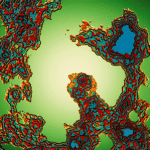Hormone replacement therapy is used to reduce some of the symptoms of menopause.
Although it can reduce problems like osteoporosis, hot flashes and depression, hormonal treatments come with risks including an increased likelihood of stroke and heart attack. Among those who use hormone therapy, scientists tend to believe there is a “critical window” where hormone replacement can reduce depression and the worsening memory associated with menopause. A new study from researchers in Xi’an, China, indicates that activating CB1 may prolong this window. They examined hormone levels, biochemical regulators of CB1, and mice’s ability to adaptively learn after inducing a mouse model of menopause. Estradiol treatment improved learning, but not when given three months after the onset of the menopause model. However, when CB1 receptor levels were artificially increased, the hormone treatment became more effective. The experimental methods cannot be directly translated to humans, but the interplay between sex hormones and the endocannabinoid system is increasingly recognized as relevant to health and medicine.
Read study: CB1 agonism prolongs therapeutic window for hormone replacement in ovariectomized mice
Adrian Devitt-Lee is a research scientist and longtime Project CBD contributor. © Copyright, Project CBD. May not be reprinted without permission.







